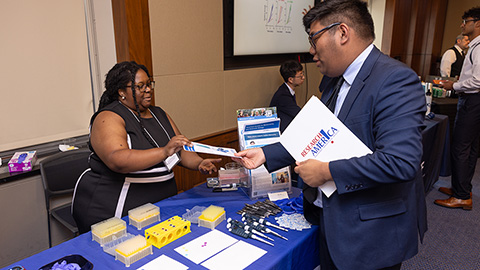ASBMB calls for student loan relief
On June 20, the American Society for Biochemistry and Molecular Biology submitted public hearing testimony to the Department of Education expressing concerns about the growing burden of student loan debt. The society called for expanding debt-relief programs across all educational levels and allowing postdoctoral researchers to defer loan payments until after completion of their training.

“We are in the midst of a student debt crisis, and it's hurting the research enterprise and more importantly, the next generation of scientists,” Sarina Neote, ASBMB public affairs director, said. “The average student debt balance has more than doubled in the past two decades, and this increase is coming at the expense of inclusivity. Student debt disproportionately affects underrepresented groups like Black, Latinx and American Indian students; the scientific workforce and enterprise will narrow and suffer if relief doesn’t come soon.”
Historically marginalized groups such as Black students take on more debt than white students and are more likely to default on their loans.
Recent Ph.D. graduates and postdocs already struggle to cover basic living costs. The student debt burden causes them to delay important milestones, such as purchasing property, which stifles the national economy, the ASBMB noted.
To alleviate these financial burdens and allow the scientific workforce to grow, the ASBMB called for the Education Department to expand public and private service programs similar to the successful National Institutes of Health loan-repayment program. This program aims to counteract “financial pressure by repaying up to $50,000 annually of a researcher’s qualified education debt in return for commitment to engage in NIH mission-relevant research.”
Neote said: “Education attainment and fulfillment should not come with such an unattainably high price tag.”
Enjoy reading ASBMB Today?
Become a member to receive the print edition four times a year and the digital edition monthly.
Learn moreFeatured jobs
from the ASBMB career center
Get the latest from ASBMB Today
Enter your email address, and we’ll send you a weekly email with recent articles, interviews and more.
Latest in Policy
Policy highlights or most popular articles

Embrace your neurodivergence and flourish in college
This guide offers practical advice on setting yourself up for success — learn how to leverage campus resources, work with professors and embrace your strengths.

ASBMB honors Lawrence Tabak with public service award
He will deliver prerecorded remarks at the 2025 ASBMB Annual Meeting in Chicago.

Summer internships in an unpredictable funding environment
With the National Institutes of Health and other institutions canceling summer programs, many students are left scrambling for alternatives. If your program has been canceled or delayed, consider applying for other opportunities or taking a course.

Black excellence in biotech: Shaping the future of an industry
This Black History Month, we highlight the impact of DEI initiatives, trailblazing scientists and industry leaders working to create a more inclusive and scientific community. Discover how you can be part of the movement.

ASBMB releases statement on sustaining U.S. scientific leadership
The society encourages the executive and legislative branches of the U.S. government to continue their support of the nation’s leadership in science.

ASBMB and advocacy: What we accomplished in 2024
PAAC members met with policymakers to advocate for basic scientific research, connected some fellow members with funding opportunities and trained others to advocate for science.

